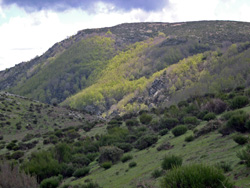Fragmentation of the forest masses reduces its genetic diversity

A study carried out by the Centre for Ecological Research and Forestry Applications (CREAF), at the Universitat Autònoma de Barcelona, undertaken by Alistair Jump, a postdoctoral researcher, and Josep Peñuelas, research professor at the CREAF and the Higher Council for Scientific Research (CSIC), has shown that the fragmentation of forest masses reduces genetic diversity.
This work which has been published in the latest edition of the North-American journal Proceedings of the National Academy of Sciences (PNAS), was carried out in the beech woods of the Montseny Natural Park, in Barcelona. In this zone, scientists have shown that fragmentation, apart from reducing and isolating populations de beech geographically, has also disturbed the species’ reproduction system, leading to an increase in consanguinity.
Alistair Jump and Josep Peñuelas point out that one of the main contributions of the work is that "up to now we have assumed that beech, and other similar species which are pollenised by the wind, were particularly resistant to the effects of fragmentation of their habitat and, therefore, ran little risk due to the effects of environmental change. This work shows, to the contrary, that this is not so: fragmentation of the habitat poses a significant risk even to this species of trees which are widely distributed and pollenised by the wind".
The researchers set up the project in the Montseny Natural Park when, in a parallel study on the effects of climate change on the genetic structure of populations, it was shown that in this zone there was precisely "a magnificent natural laboratory " for the study of fragmentation.
"This area is almost unique in the world due to the presence of numerous replicas of fragmentation, very close to each other, and with, at least, many centuries of existence", say the researchers. The scientific team has carried out its work by comparing fragments of the forest with the unfragmented forest mass.
Many plant and animal populations, including humans, depend on the forests for the products and services they provide. For the researchers at the CREAF-Universitat Autònoma de Barcelona, "this study shows we have to avoid the fragmentation of forests into smaller populations, in order to maximise possibilities of survival in the long term".

